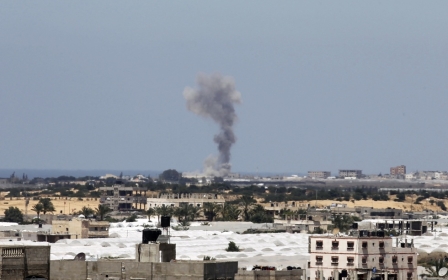Palestinian leaders meet in wake of Israeli suspended talks

A key body of the Palestine Liberation Organisation (PLO) is holding talks Saturday after Israel pulled out of US-sponsored peace negotiations in response to a Palestinian reconciliation deal with Hamas earlier this week.
The PLO’s Central Council meeting at its West Bank headquarters in Ramallah Saturday morning began with a short speech by President Mahmoud Abbas who said the unity government will recognise Israel and should refrain from violence, according to the AFP.
Dalia Hatuqa, a West Bank-based journalist, has been covering the introductory speech by Abbas on Twitter:
Abbas reportedly condemned the decision by Israel to suspend peace talks:
Stay informed with MEE's newsletters
Sign up to get the latest alerts, insights and analysis, starting with Turkey Unpacked
He also discussed recognition of Israel and its status as a Jewish State:
The meeting has been arranged to discuss the crisis in negotiations, but will also cover the unity deal made on Wednesday with Hamas.
Israel suspended peace talks over the deal, saying it would have no dealings with a Palestinian government involving Hamas.
“He [Abbas] can have peace with Israel or a pact with Hamas – he can’t have both,” Israeli Prime Minister Benjamin Netanyahu told the BBC’s Jeremy Bowen in an interview on Thursday.
Chief Palestinian negotiator, Saeb Erekat, dismissed Netanyahu’s comments and said reconciliation is a matter for Palestinians alone.
“Israel had no right to interfere in this issue,” he told the Associated Press.
US officials had been hoping to extend failing peace talks beyond their 29 April deadline, but efforts were damaged last month when Israel refused to release a final batch of Palestinian prisoners.
The Palestinians responded by applying to join 15 international treaties. Abbas also put conditions on extending beyond the deadline, saying he would agree to an extension if Israel froze settlement construction in the occupied West Bank and east Jerusalem, freed the prisoners and began discussions on the borders for a future Palestinian state.
Israel refused the conditions and on 1 April announced that 708 new settlement homes are to be built in occupied East Jerusalem.
Tensions high
After the unity deal was announced on Wednesday, an Israeli airstrike on a northern area of the Gaza Strip injured a 50-year-old man and his two daughters, according to a local medical official speaking to the AFP.
It emerged on Saturday that Israel has lodged a complaint with the United Nations Security Council against Palestinian rocket attacks from the Gaza Strip.
Israel's Permanent Representative at the UN Ron Prosser said the Palestinian Authority "cannot wash its hands from terrorist assaults" in the Gaza Strip when speaking to an Israeli radio station on Saturday.
On Friday, Human Rights Watch released a statement calling on Israeli forces to stop shooting at civilians in Gaza, which has killed at least four people since the start of the year.
“Shooting at civilians is not a lawful policy near Gaza’s perimeter fence or anywhere else,” Sarah Leah Whitson, Middle East director at Human Rights Watch, said in the statement.
“Israeli commanders need to change their policies and practices to abide by international law, not flaunt it,” she added.
Rockets fired from Gaza have killed 46 Israelis since 2005 and 4,869 Palestinians in Gaza have been killed by Israeli security forces in the past 14 years, according to statistics from B'Tselem, an Israeli human rights organisation.
Meanwhile US President Barack Obama has spoken of a need to stop and review the peace process.
“There may come a point at which there just needs to be a pause and both sides need to look at the alternatives,” Obama told reporters on a trip to South Korea on Friday.
“What we haven’t seen is the political will to make tough decisions, frankly, and that’s been true on both sides,” he added.
In the unity deal penned this week, Hamas and the Fatah-led PLO agreed to establish a "national consensus" government under Abbas within weeks.
Delegates from Hamas were invited to participate the weekend PLO meeting, but sources from the movement said they would not be attending for unspecified reasons.
Middle East Eye delivers independent and unrivalled coverage and analysis of the Middle East, North Africa and beyond. To learn more about republishing this content and the associated fees, please fill out this form. More about MEE can be found here.




